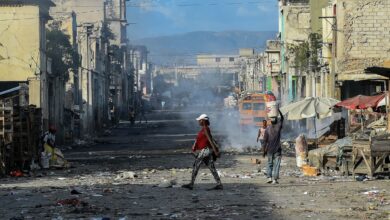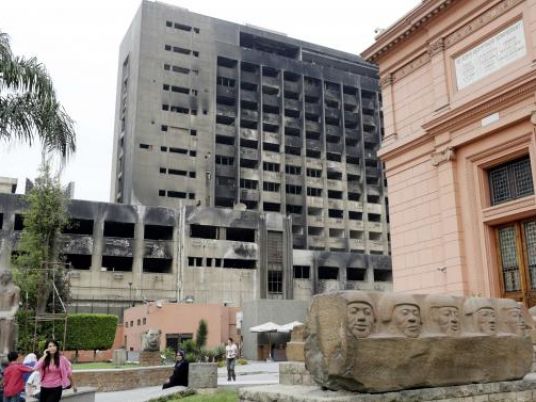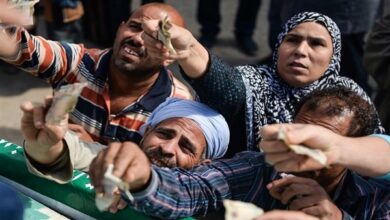The proceedings of Sunday’s meeting of the leadership of the National Democratic Party (NDP) dominate the newspapers today. The meeting–the first since President Mubarak returned to Egypt after surgery in Germany last month–was chaired by NDP Secretary General Safwat el-Sherif and attended by Chief of Presidential Staff Zakariya Azmy, Minister of Parliamentary Affairs Mofid Shehab, Policies Secretariat Chairman Gamal Mubarak, NDP Media Secretary Ali Eddin Helal, and steel magnate and Chairman of the Planning and Budget Committee of the People’s Assembly Ahmed Ezz.
Al-Ahram reports that the NDP will conduct "intensive" meetings with Prime Minister Ahmed Nazif in the coming days to discuss the state budget. The paper features Safwat el-Sherif’s announcement, "Studies to raise minimum wage to alleviate citizens’ suffering," as its headline. Al-Ahram’s report notes that the General Federation of Trade Unions has called for the minimum wage in the private sector to be LE900 per month. Al-Akhbar’s top story also covers the NDP’s stated intention to follow the president’s directives to "not tamper" with state support and el-Sherif’s statement that the NDP "refuses all forms of corruption" and calls for "clear responses" to all issues raised by the media.
Egypt’s nuclear program also comes under the spotlight today, as the front pages of both Al-Ahram and Rose el-Youssef cite Foreign Minister Ahmed Abul Gheit’s statement at the Nuclear Security Summit in Washington yesterday that "Egypt rejects any restrictions on its peaceful nuclear power program." Abul Gheit expressed Egypt’s "shared goal" of nuclear disarmament and its commitment to ridding the Middle East of nuclear weapons. Al-Ahram’s report reiterated President Barack Obama’s summit statement that preventing nuclear weapons from falling into the hands of terrorist organizations, ‘such as Al Qaeda,’ is the biggest challenge the world faces today.
Al-Shorouq and Al-Dostour cover the results of an attempt by TV show Masr el-Nahardah’s (Egypt Today) to end the feud between chancellor Mortada Mansour and TV presenter Ahmed Shobeir. The two parties did not reconcile, and the show ended up featuring an unprecedented use of expletives instead. The episode "imposed itself" on yesterday’s Shura Council meeting, according to Al-Shorouq, since many members found it "shocking and against Egyptian traditions and values" and called for strict measures placing all shows–especially those airing on satellite channels–under performance review to make sure they conform with "societal and religious values."
Al-Dostour’s makes good use of striking photos on its front page with a report that notes that the main topic of discussion yesterday between Shura Council members, while demonstrating farmers and workers continued their "sleep-in" outside the council building, was the offending TV episode rather than the workers’ demands. According to Al-Dostour, Shura Council Speaker Safwat el-Sherif called for the formation of a committee to "adjust" the ethical code of conduct for media outlets and place clear restrictions on both state and private media alike.
Al-Wafd’s top story concerns a report in The Faster Times magazine discussing the "hashish crisis" in Egypt. Voicing indignation, Al-Wafd runs with the headline: "Hashish crisis reaches American press." Al-Wafd describes the report as "rude and derisive" for saying that the biggest topic of conversation in Egypt is the disappearance of hashish.
Al-Wafd writes that the "silly" report outlined two prevailing "conspiracy theories" explaining the country’s hashish shortage: The first theory proposed that drug dealers, in an attempt to raise prices, are behind the shortage. The second theory claimed that the Egyptian government controls the drug trade and is responsible for the shortage, and intends to flood the market right before the elections to return people to "unconsciousness" and make the process of stealing the elections easier.
Egypt’s newspapers:
Al-Ahram: Daily, state-run, largest distribution in Egypt
Al-Akhbar: Daily, state-run, second to Al-Ahram in institutional size
Al-Gomhorriya: Daily, state-run
Rose el-Youssef: Daily, state-run, close to the National Democratic Party’s Policies Secretariat
Al-Dostour: Daily, privately owned
Al-Shorouq:Daily, privately owned
Al-Wafd: Daily, published by the liberal Wafd Party
Al-Arabi: Weekly, published by the Arab Nasserist party
Youm7: Weekly, privately owned
Sawt el-Umma: Weekly, privately owned




